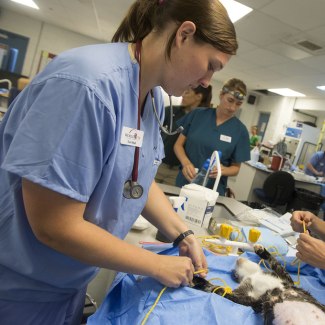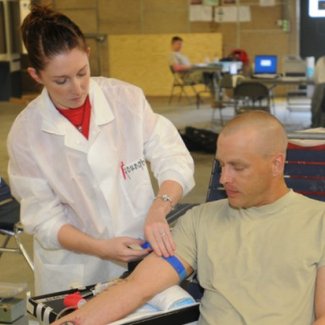
A veterinary technician holds an associate’s degree, but the technologist is educated to the baccalaureate level. Technologists typically obtain a 4-year bachelor’s degree in Veterinary Technology before going to work. By virtue of their higher education, veterinary technologists have improved career advancement opportunities, although it takes them longer to finish their formal education. How long does it take to become a vet tech? It takes approximately 4 to 5 years to get the necessary training and then qualify as a state-licensed Veterinary Technologist.
Becoming a Vet Tech
Vet Tech School
Accredited veterinary technology programs have been formally evaluated by the American Veterinary Medical Association (AVMA). According to the U.S. Bureau of Labor Statistics, there are 22 accredited colleges that offer a bachelor’s degree in Veterinary Technology leading to certification as a technologist. Veterinary Technology programs consist of general education coursework, classroom instruction in animal science, and hands-on clinical and laboratory practice with live animals. Most VT programs are designed to prepare students for work in diverse settings ranging from veterinary offices and neighborhood clinics to laboratories and even zoos.
A Veterinary Technology education can serve as a gateway to more advanced positions in the world of animal health care. For example, a student who eventually intends to become a veterinarian may earn a B.S. in Veterinary Technology with a concentration in Pre-Veterinary Medicine to prepare as an undergrad. Technologists, with their bachelor degrees, are ideally suited to take on greater responsibilities or pursue a graduate education. Some veterinary technologists even go into research, advancing the field to expand the depth and utility of the veterinary technologist role.
Certification and Licensure
A trained technologist cannot legally go to work without getting licensed. After graduating, they must pursue a license with the state in which they intend to practice. Regulations vary, but nearly all jurisdictions require success on a qualifying examination approved by the Board of Veterinary Examiners, frequently the Veterinary Technician National Examination. Vet technologists who have graduated from an accredited VT program have the option of pursuing a professional credential with the AVMA. In most cases, certification is voluntary, but it is often valued by employers and may lead to a higher salary.
Veterinary technologists can also specialize, much like veterinarians themselves. The National Association of Veterinary Technicians in America (NAVTA) has developed quality assurance standards for many Veterinary Technician Specialist (VTS) certifications. Numerous academies approved by NAVTA’s Committee on Veterinary Technician Specialties now offer specialty certification across a range of subjects, such as Dental, Internal Medicine, Zoological Medicine, or Nutrition. For aspiring research workers, for instance, there are 3 specialty certifications issued by the American Association for Laboratory Animal Science.












Leave a Reply